Free network tools for Admin
In this article, I will show you seven free networking tools, which are really useful tools for network administrators.
The budget cuts in the era of recession have become old. The amount of money invested for new employees and tools is significantly reduced. Network administrators need to find tools and other ways to improve this situation. Free tools are also considered to be one of the criteria to be addressed. To meet that part, in this article, we want to mention seven free networking tools that can make your daily work easier. Most of them do not require installation, users can carry them on tiny USB devices.
Free network tools for Admin
- 1. Ping and Traceroute in Pingplotter
- 2. Who is using your network? Angry IP Scanner will help you answer this question.
- 3. Detect WiFi with Metageek inSSIDer
- 4. Dive deep into the network with Wireshark
- 5. Telnet (SSH) is safe with PuTTY
- 6. Avoid losing records: SolarWinds Kiwi Syslog Server
- 7. Measure bandwidth by Iperf
- 8. Nmap / Zenmap
- 9. Paessler SNMP Tester
- 10. Nagios
- 11. NTOPNG - High-speed web-based traffic analysis
- 12. A real-time overview of the whole network with Real-Time NetFlow Analyzer
- 13. Ansible - Tool for those who don't like repetitive tasks
- 14. Netmiko
- 15. SolarWinds TFTP Server
- 16. SolarWinds SFTP / SCP Server
- 17. Notepad ++ / UltraEdit / Sublime Text
- 18. Cygwin
- 19. Draw.io
1. Ping and Traceroute in Pingplotter
Download: http://www.pingplotter.com/freeware.html
Free software: Windows operating system
Pingplotter is a tool that combines basic Ping and Traceroute commands into an easy-to-use graphical interface. The advantages of using Pingplotter are many. The program can trace complex traces to reach any destination you specify, then combine those traces and display the results graphically. This graph includes a line showing the average trend. You can export the results as a text file or graph image. Pingplotter is the first tool I use when I suspect a problematic system.

Figure 1: Free software PingPlotter
2. Who is using your network? Angry IP Scanner will help you answer this question.
Download: http://www.angryip.org/w/Download
Open source program: Windows / Mac / Linux operating system
Angry IP Scanner is a pretty light and fast tool. The program does not require installation and allows easy use. Users only need to enter the IP range to scan and click Start . After performing the analysis, Angry IP Scanner will provide you with a list of all devices on the network, including hostnames and open ports. Here is a list of things you can use:
- Scan the network to find out if someone is connecting with unauthorized devices - such as WiFi hotspots with bad intentions.
- Have you ever planned to maintain electricity for the building? Tell your users to turn off the computer when they go home, then scan the entire network to see if there are still computers on your network that still work randomly.
- Use port scanning to check some basics about vulnerabilities or see if someone has installed web servers or emails without your knowledge.
- Check how many free IP addresses you have on a subnet, then optimize your DHCP scope.
Tip : Most personal firewalls block ICMP (ping). If you have a network of Windows computers, you can apply group policies to allow ICMP (ping) from those sources - just like your administrator computers.
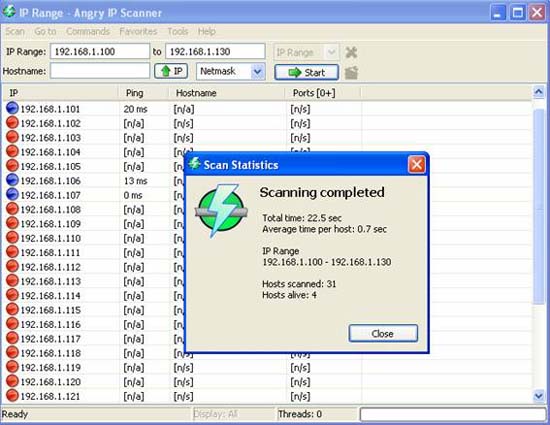
Figure 2: AngryIP Scanner
3. Detect WiFi with Metageek inSSIDer
Download: http://www.metageek.net/products/inssider/download
Open source program: Windows operating system
Metageek inSSIDer is a WiFi detector like the well-known Netstumbler product, but it will win your affection in recent updates and can run on Vista / Windows 7. The program has can detect and display all wireless networks in the region. Even more, it has a graphical display, which makes it easy to see which networks have been discovered, which channels they use, their hardware platforms and the signal strength of the network. . You will know immediately whether your APs are affected by interference from nearby networks, or whether someone has installed bad access points or created dangerous security holes. Another simple use case is that you can also use the program to find out which WiFi network is best for your iPhone.

Figure 3: WiFi Metageek inSSIDer detector
4. Dive deep into the network with Wireshark
Download: http://www.wireshark.org/download.html
Open source program: Windows / Mac / Linux / Unix operating system
In recent years, Wireshark (formerly known as Ethereal) has become a useful software for network analysis. There are very few products that have special features like Wireshark and this is rooted in why. Suppose you want to know what is really happening on your network. Wireshark will capture the packets, then display them in such a way that you can easily follow the 'conversations' and access between computers. It has almost endless sorting and filtering options, allowing you to find exactly what you're looking for. This tool can also analyze dump files from other software packages like MS Network Monitor.
5. Telnet (SSH) is safe with PuTTY
Download: http://www.chiark.greenend.org.uk/~sgtatham/putty/download.html
Open source: Windows / Unix / Linux / Mac (unofficial port)
Personally, I will not use Telnet. Although this is a fairly fast and simple tool, Telnet has some security issues that are passing passwords in text form. Fixing this error is simple, we just need to enable SSH encryption on network devices and use PuTTY as a Terminal Emulator. PuTTY is a very flexible tool and does not require installation. It supports serial connections (Serial) and can still perform Telnet when needed. Support copy / paste commands to help you avoid unnecessary typing, and it can perform Secure FTP.
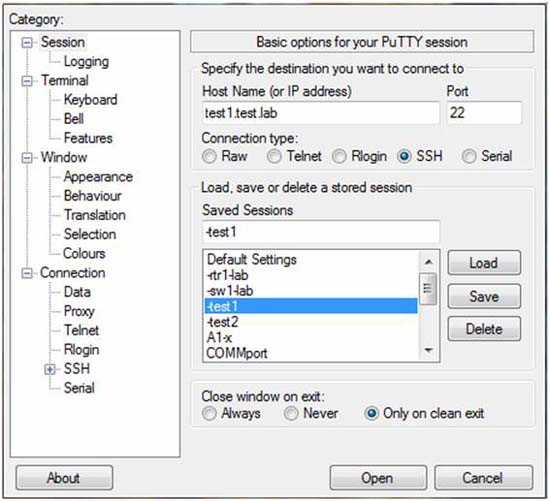
Figure 4: Set PuTTy as a terminal emulator
6. Avoid losing records: SolarWinds Kiwi Syslog Server
Download: http://www.solarwinds.com/Products/freetools/kiwi_syslog_server/
Free registration: Windows
Have you ever encountered the case that your logs disappear after someone restarts the router? To prevent this situation, you need a syslog server. SolarWinds' Kiwi Syslog Server can help you avoid this situation. Configure all your network devices so that they send log messages to the syslog server, so you will never lose important information like the case above.
7. Measure bandwidth by Iperf
Download: http://sourceforge.net/projects/iperf/
Open source: Linux / Windows operating system
Iperf is a great bandwidth testing tool, it can help you find network problems. Do you suspect your 100Mb connection has a problem (not reaching the bandwidth as registered). Use Iperf on computers at the end of each connection, perform a test and see how the actual results are. The program does not require installation and can measure TCP and UDP, jitter, and some other metrics.

Figure 5: Iperf bandwidth testing tool
Note : Some tools may be considered as hacking tools for company security policies. If in doubt, join with your network administrator before downloading or using them.
8. Nmap / Zenmap
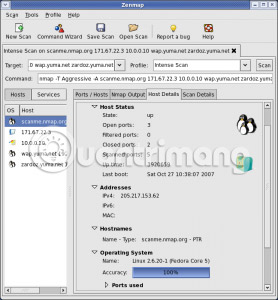
Many people have a habit of using Nmap at least once a week. According to the company's official website Nmap.org (Network Mapper) is a security scanner used to discover servers and services on a computer network, thus creating a 'map' of people's networks. use. To accomplish its goal, Nmap sends specially designed packages to the destination server and then analyzes the responses.
Nmap provides some amazing features for exploration networks, including server detection, service detection and operating system detection. These features can be extended with scripts, providing more advanced detection of services, vulnerabilities and other features. Actually, Nmap is used in the backend section for various security assessment tools like Nexpose.
Again, if you're a fan of the GUI, download the package with Zenmap.
9. Paessler SNMP Tester
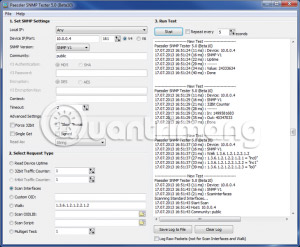
SNMP (Simple Network Management Protocol) is not simple. This is why you need a good testing tool. You can find some options on the Internet, but the most popular option is Paessler SNMP Tester.
The goal of this program is to create a tool that allows users to debug SNMP operations, to find communication and / or data problems in SNMP monitoring configurations. Is your device properly configured? Are you using the correct keys? Use this tool to verify whether your SNMP configuration works with programs like PRTG Network Monitor.
10. Nagios
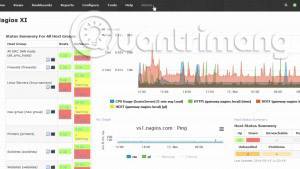
Nagios.org is a network monitoring software solution. In fact, it has a set of solutions for monitoring network availability, data flow analysis and security, as well as collecting test logs. It has complete open source and a vibrant community with the participation of developers and like-minded administrators.
With Nagios XI, you can monitor everything from infrastructure to applications. With Nagios Log Server, you can quickly select a central repository for test logs or enable settings to alert important events, such as threats. And with Nagios Network Analyzer, dig deeper into the 'health' and integrity of the system and network you're using, analyze traffic, validate goals, and troubleshoot.
The most special thing in Nagios is a simple approach to monitor and monitor the operation of the system. This tool has many ways to visualize data in a visual way. That's a pretty big plus. Finally, the built-in failover feature will be useful if you start to control larger environments.
11. NTOPNG - High-speed web-based traffic analysis
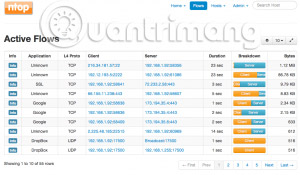
Named after the most common command name in Unix, ntop shows that network usage is similar to the way the top displays the use of the system. Ntopng, based on libpcap, is the next generation version of the original ntop. It is written in portable format, allowing the program to be flexible when running on multiple platforms, including Linux, Mac OSX and Windows.
Based on the web, ntopng allows you to view traffic data and collect reports related to network status. You can use multiple criteria to sort, including IP addresses, ports, Layer 7 assignments, BGP AS, etc. You can even create long-term reports to collect metrics like throughput. by the time. Many people use this tool to create detailed server-based reports, showing latency of applications, RTT and TCP statistics.
12. A real-time overview of the whole network with Real-Time NetFlow Analyzer

When it comes to troubleshooting network performance at a site or from a specific perspective, many people choose SolarWinds' Real-Time NetFlow Analyzer. This tool is free and simple to use. By activating this tool and viewing traffic through a router or interface, it can help users save hours. Easily identify users, applications and devices that consume the most bandwidth.
If you like this tool, you should upgrade it to the full version. It really is a great tool.
13. Ansible - Tool for those who don't like repetitive tasks
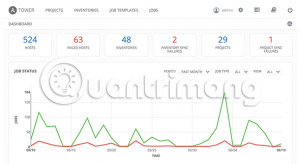
Ansible.com is a simple and powerful automation tool, with the goal of reducing repetition of actions by automating tasks. This tool is relatively easy to use because Ansible's view is that automation should not be more complicated than the tasks it replaces.
From a network perspective, many people like to use this tool to create configuration files based on custom templates. I can quickly build options for almost any situation, ensuring that configuration files are built correctly based on the standards and network devices that are configured appropriately.
If you want to get more with the GUI, consider Ansible Tower.
14. Netmiko
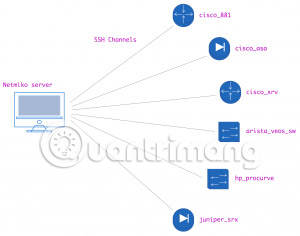
Created by Kirk Byers, Netmiko is a multi-vendor Python library, to simplify Paramiko, directing it to network devices. This is an advanced tool and is only useful if you use Python for programming or automation. It simplifies SSH connections, executes commands and retrieves data.
Each vendor has its own characteristics related to interaction in the shell environment. Netmiko is designed to simplify this lower level SSH management for a wide range of network providers.
Netmiko currently supports the following platforms:
- Cisco IOS, IOS-XE, IOS-XR, ASA, NX-OS and WLC (with limited testing)
- Arista EOS
- HP ProCurve
- HP Comware (limited test)
- Juniper Junos
- Brocade VDX (limited test)
- F5 LTM (test)
- Huawei (limited test)
15. SolarWinds TFTP Server
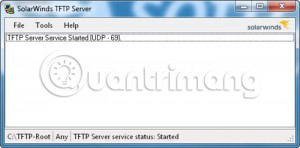
As a network administrator (admin), you will have to transfer the configuration file or image file to the router. TFTP has allowed users to easily perform this task for many years and although alternative protocols have appeared, many people still choose TFTP.
This is why many people opt for TFTP server applications to use on their laptops. You can consider SolarWinds TFTP Server. It's a multithreaded, reliable, free and almost no-rival tool.
With a newly added small feature, you can actually authorize specific IPs or ranges to restrict sending and receiving directly to the server (for advanced security). And if you do this often or from a central server, run it as a service available 24/7.
16. SolarWinds SFTP / SCP Server
SFTP and SCP are two of the many previously mentioned protocols.
If you have the ability to use security protocols instead of TFTP, do so, just make sure you have reliable software like SolarWinds SFTP / SCP Server.
Like the TFTP Server, SolarWinds SFTP / SCP Server software is often used to upload and download executable images and configure backups for routers and switches. You can authorize specific IPs or ranges to restrict sending and receiving directly to the server (for advanced security) and run as a service on the central server.
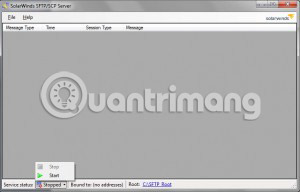
Suppose you need one of these tools, it is possible that you are transferring configuration or image files to / from network devices. If you have never used such a tool, you should try to consider SolarWinds Network Configuration Manager. You can try it for free and then pay to continue using it. Very 'worth the money for rice'!
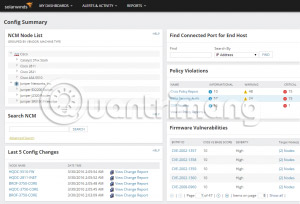
17. Notepad ++ / UltraEdit / Sublime Text
If you're still using the old old Notepad, you don't know what you've missed. Use one of these text editors, make sure you don't regret it!
18. Cygwin

If you have ever used Linux, then you have become familiar with useful commands like ' grep', 'ls', 'top', 'df', 'pwd ', etc. In the Windows world, people Some of these commands are missing, and if so, they are written with some other non-intuitive syntax. Wouldn't it be great to have Linux commands and applets in Windows? Cygwin is the solution you are looking for.
Cygwin.com is a large collection of GNU tools and open source, providing the same functionality as the Linux distribution on Windows. You can not only run familiar commands but also download (similar to apt-get or yum) different Linux tools. Some of the most favorite commands are wget and curl. If you're running Windows, you should try using Cygwin.
19. Draw.io
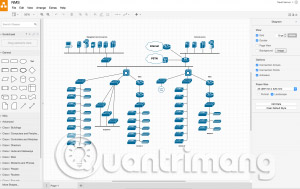
Visio is definitely the best tool for designing network diagrams. However, it is a bit expensive and only runs on Windows. Many Mac users run Windows VMs only to be able to use Microsoft Visio. However, there is an alternative solution to use Draw.io, a browser-based charting application. Great!
Whether you're building technical diagrams or network diagrams, Draw.io has tons of templates to get started. It connects with online storage environments like Dropbox and Google Drive to save real time. Therefore, users no longer fear losing data. Again, it's free and cloud-based diagrams can be shared and exported.
See more:
- 10 free and useful network tools
- 10 free search tools for Windows 10
- Free working tools for businesses
You should read it
- About inSSIDer software
- 7 best network troubleshooting tools 'save' your home network
- Use Wireshark to analyze data packets in the network
- Solve the real problem with the Network Diagnostic function
- 5 best tools to detect 'errors' on the network you are using
- Instructions to scan the network port with Advanced Port Scanner
 The Fsutil objectid command in Windows
The Fsutil objectid command in Windows What file is CDDA? How to open, edit and convert CDDA files
What file is CDDA? How to open, edit and convert CDDA files What file is AAC? How to open, edit and convert AAC files
What file is AAC? How to open, edit and convert AAC files Secedit command in Windows
Secedit command in Windows WiFi - 802.11b, 802.11a, 802.11g, 802.11n and 802.11ac standards
WiFi - 802.11b, 802.11a, 802.11g, 802.11n and 802.11ac standards The Fsutil quota command in Windows
The Fsutil quota command in Windows